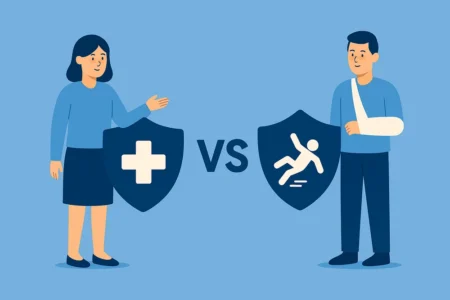Table of Contents
There was a time when the function of an HR manager was seen as purely administrative. Those days are gone. Now, HR managers are viewed as strategic partners to meet business goals.
HR Managers drive change, promote innovation, and sustain a positive work environment. Their function is also to attract, develop, and retain talent. They handle employee relations and ensure that labour laws and regulations are followed.
Further, HR managers participate in training and development programs. These programs help employees acquire skills and knowledge to promote productivity and job satisfaction.
With performance management systems, HR managers can discover areas for improvement and feedback. They can also nurture employee wellbeing by making wellness products such as Onsurity health plans an essential component of health and wellbeing policies at work.
A recent Boston Consulting Group study showed how the function of an HR manager in India is changing.
- 85% of CXOs emphasised the importance of Environmental, Social, and Governance initiatives in shaping HR strategies.
- 72% of companies are implementing policy changes to enhance work-life balance.
- Indian CXOs are emphasising the role of Diversity, Equity, and Inclusion (DEI). 49% of them reported integrating diversity metrics across levels.
In these ways, HR managers can boost productivity and create a supportive work culture. Here are the nine vital functions of an HR manager.
9 Major Roles and Responsibilities of HR Manager
1. Recruitment and Hiring
The recruitment and hiring process is about more than simply filling vacant posts. In its true sense, it is about picking and onboarding individuals with the skills and the mindset to match the company’s needs and culture.
When the right people are hired, they can play a key part in organisational success. Here are the steps in the recruitment and hiring process:
- Job Posting: When needed, HR managers create job descriptions for vacant positions. These include the necessary qualifications, skills, and responsibilities expected. These vacancies are advertised on websites, online boards, and newspapers and, sometimes, in the case of employee referral programs, spread through word of mouth.
- Screening and Shortlisting: The resumes sent to the company by prospective candidates are screened for suitability. Then, potential candidates are shortlisted.
- Interviewing: Shortlisted candidates are called for interviews or meetings with department heads, depending on the seniority of the role. Aptitude tests and personality assessments may also be used to evaluate candidates before and after interviews.
- Background Checks: A necessary function of some HR departments is to verify the candidate’s details with respect to employment history and educational qualifications.
- Offer and Onboarding: Once a suitable candidate has been selected, the HR manager will make a job offer. This offer will include salary, terms, and conditions. When the candidate joins, there should be an onboarding exercise during which new hires are integrated into the company.
A recent study shows the importance of selecting the right candidate and the result of hiring the wrong one. According to the report, three of 10 Indian companies said that one bad hire cost them over Rs. 20 lakh on average.
Also read: Top 15 HR Challenges, Issues and Solutions
2. Employee Health and Wellbeing Policy
It is well known that healthy and happy employees are productive. Therefore, the function of an HR manager should be to create and manage policies for employee well-being. Such policies boost productivity and reduce absenteeism. They also make the company a desirable place to work.
Employee well-being policies take many forms, from ergonomic chairs and tables to providing mental health resources. Essential steps are regular health screenings, group health insurance, and fitness initiatives.
HR managers can rely on professional wellness plans crafted by organisations such as Onsurity as part of talent management initiatives. Onsurity offers comprehensive health and wellness plans in which members can opt for group health insurance and group term life insurance benefits. The health membership includes in-app health check-ups, free doctor consultations, and gym memberships.
3. Training and Development
Apart from hiring recruits and filling job vacancies, the HR department is also responsible for the continuous skill development of the workforce. As markets change and the company grows, employees will be expected to grow on the job and be ready for higher roles in the future.
L&D can help businesses reach their goals by upgrading employee skills to improve performance. These improvements boost productivity through increased efficiency. L&D initiatives also increase creativity and problem-solving skills.
HR managers can conduct skill gap surveys and ensure that training programs support organisational priorities. They can also advocate for adequate L&D funding and track initiatives to measure impact. Overall, they can create an environment of ongoing learning and improvement.
The rise of AI and market changes mean that upskilling employees, linking learning programs to business goals, and creating a culture of learning have become the top focus areas of the HR function. A study mentions that at least 94% of companies in India plan to enhance their employees’ skills and abilities in 2024.
Also read: 6 Exciting New Year Resolutions for HR Professionals
4. Talent Management
Talent management is a strategic approach to identifying, developing, and retaining high-potential employees. Employees can be provided with continuous learning and feedback and encouraged to rise within the company through several development opportunities. The function of an HR manager is to spot and nurture such talent.
Talent management can start with regular performance reviews to understand which employees are doing better than others. Regular feedback and relevant training will help them refine and improve their activities. Proper compensation, benefits, and promotions will boost engagement and loyalty.
An academic study shows that proper talent management practices reduce employee turnover. The study concludes that talent management strategies help enterprises overcome any potential talent shortage and create a healthy and engaged workforce.
5. Employee Performance Management
For an HR manager, employee performance management means monitoring and managing employee performance, setting objectives, and providing feedback. These activities need to be carried out after alignment with company and departmental goals.
Performance management involves several methods and techniques. It starts with employee goal setting, regular reviews, and continuous feedback. Performance appraisals should be fair and based on measurable criteria. Recognition and rewards should also be built into the performance management plan. Employees should be encouraged to meet goals without fail via discussions and training.
A Price Waterhouse Coopers survey in India demonstrates the impact of proper performance management. Their data indicates that 93% of companies surveyed feel that performance management supports the delivery of business objectives. Gallup data further shows that 80% of employees who say they have received meaningful feedback have higher engagement levels.
Suggested read: Top 10 Employee Engagement Activities in the Office
6. Employee Relations
Employee relations is another important aspect of an HR manager’s function. This means building positive interpersonal relationships between employees. It includes prompt and unbiased resolution of disputes. Creating and sustaining online and offline communication channels is a large part of employee relations.
Structured conflict resolution policies are important for the fair settlement of any disputes that arise during work. With open feedback channels and fair, transparent treatment, employees will feel confident about speaking up and expressing concerns. These practices will also prevent small disagreements from becoming large roadblocks.
Many studies have shown a strong link between positive workplace relationships and employee satisfaction. The Pew Research Center found that high satisfaction rates with workplace relationships play a significant role in workers’ satisfaction.
7. Company Culture Development
A company’s culture and values directly affect its employees’ performance. For HR managers, this function means shaping a work environment so that the company culture becomes a zone of high engagement, satisfaction, and performance.
Three important HR policies can shape company culture: values-based hiring, inclusive policies, and recognition programs. With values-based hiring, new employees are viewed according to alignment with the company’s core values, not just skills and experience.
With inclusive policies, the environment is one in which all workers feel valued and respected. Recognition programs that acknowledge the contributions of employees and teams boost morale and job satisfaction.
A Deloitte study shows that 94% of executives and 88% of employees acknowledge the critical role of organisational culture in determining a company’s success. As many as 76% of employees highlighted the influence of a defined strategy for a positive culture.
Quick read: 10 Ways to Improve Employee Experience in the Workplace
8. Compliance and Legal Responsibilities
HR managers have another critical responsibility: ensuring compliance with the country or region’s labour laws, health and safety standards, and employee management records. They must stay up-to-date with any changes in these procedures. Often, technology, such as record-keeping and reporting programs, is very helpful.
Non-compliance can have severe consequences. For example, there may be legal and financial penalties, and the company’s operations may be restricted for some time. A drop in health and safety standards can also affect employee well-being and productivity.
The cost of non-compliance with labour and tax laws can be severe. Hefty fines and penalties apart, there is also the long-term decline of the company’s reputation.
In 2020, the Indian government stipulated mandatory rules for organisations to provide group health insurance to employees. Onsurity can be your go-to partner for a cost-effective and convenient way to provide health insurance benefits to employees, with comprehensive plans to ensure your team is fully covered.
As businesses’ legal and regulatory environments continue to change, Onsurity Plus can safeguard them against risks associated with labour laws. Additionally, given the increasing frequency of cyber-attacks, data security has become a critical concern for businesses today.
In this context, Onsurity CyberSure is a policy that covers financial losses from a privacy or security breach. It also pays to rectify the damage through legal and other experts.
9. Succession Planning
Succession planning refers to spotting and developing employees who can go on to fill leadership roles in the organisation. It is important because it ensures a seamless leadership process and organisational stability. According to a recent survey, as many as 35% of MSME owners feel succession planning is their biggest challenge.
The positions for which the HR manager conducts succession planning are typically those that are significant to the company. Some examples are the CEO, CFO, and similar leadership positions.
HR managers can successfully conduct succession planning by surveying available talent, conducting performance reviews, and noting possible future needs. Then, they can provide mentorship, coaching, and training for skill development.
Sometimes, talented employees are assigned key projects to assess their capabilities. This process should be continuous and aided by regular reviews and tracking.
Also read: HR’s Guide to Maternity Leave and Healthcare Benefits
Summing Up the Function of an HR Manager
Today, HR managers’ roles extend far beyond traditional administrative tasks. They can drive change, boost innovation, and help create a positive work environment that promotes employee well-being.
Apart from hiring the right talent, some other vital HR functions are developing health and wellness policies, training and development, performance management, and cultivating a strong company culture.
They need to sustain diversity, equity, and inclusion (DEI) efforts, boost employee engagement, and integrate wellness programs. HR managers also help align business goals with employee skills and performance.
Health and wellness benefits from Onsurity can enhance employee satisfaction and add value to an HR manager’s function. Onsurity offers comprehensive healthcare benefits. Company personnel get discounted medicines and professional health check-ups, along with group health and accident insurance.
Contact Onsurity today to find out more. Discover how a holistic approach to employee well-being can aid productivity and organisational success.
FAQs
1. What are the primary responsibilities of a Human Resource Manager?
Apart from recruitment and hiring, an HR manager has to:
- Enable performance reviews in line with organisational goals
- Ensure that training needs are met to improve skills
- Foster a supportive company culture
- Put in place health and well-being policies
2. What human resource functions can be outsourced?
Among the functions that can be outsourced are:
- payroll processing
- training programs
- technology management
- health policies
3. What initiatives can an HR manager implement to boost employee engagement and morale?
HR managers can establish a system of rewards and recognition for achievements, suggest career development prospects, inculcate team-building activities, and promote a healthy work-life balance.
4. What benefits should an HR manager consider for attracting and retaining employees?
An HR manager can offer health benefits, paid time off, and flexible work arrangements. In addition, opportunities for growth, recognition, and a positive company culture are important.
5. How can an HR manager identify training needs within the organisation?
Some ways are:
- performance reviews
- feedback from managers
- skills gap analysis







